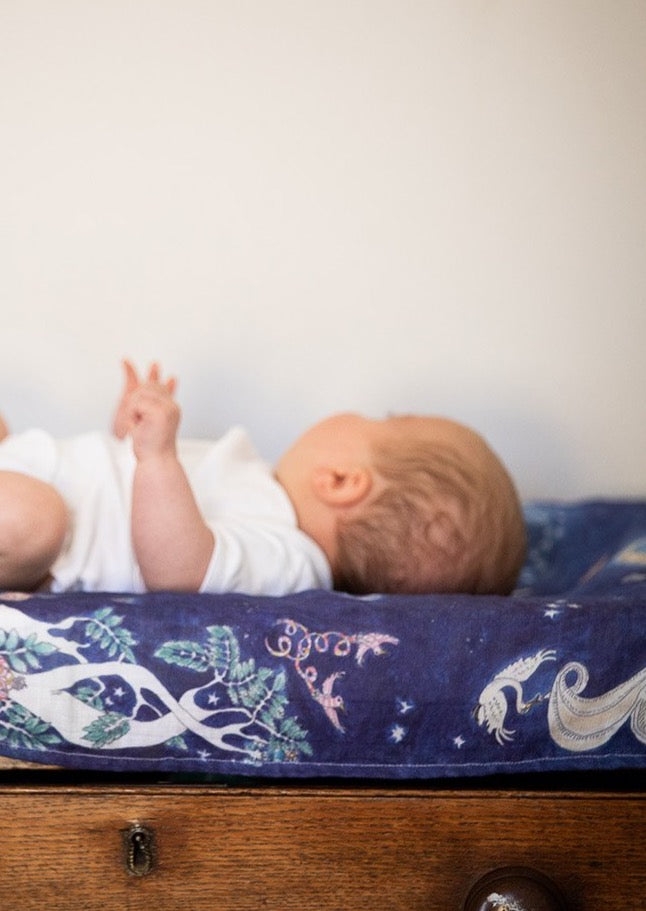How to Care for Your Baby Muslins

Maintaining your baby's muslins will keep them safe, resilient, and soft for your child. Here are some essential care tips:
Careful Cleaning: Always wash muslin cloths in cold or barely warm water to maintain their softness and prevent shrinkage.
Use a mild detergent that is safe for babies and devoid of harsh chemicals and odors.
Avoid Fabric Softeners: Fabric softeners can leave a residue on muslin cloths, reducing their absorbency and softness.
Skip the dryer: Air-drying is best for muslin cloths. If you must use a dryer, opt for a low-heat setting.
Separate Wash: Wash muslin cloths separately or with similar lightweight fabrics to avoid damage from heavier items.
Inspect Regularly: Check muslins for signs of wear and tear, such as fraying edges or holes, and replace them as needed.
Why Are Baby Muslins So Popular?
Baby muslins have become a staple for parents worldwide due to several reasons:
Versatility: Muslins serve multiple purposes, from swaddling and burping to shading and nursing covers.
Breathability: The lightweight and breathable nature of muslin fabric ensures babies stay comfortable and reduces the risk of overheating.
Softness: With each wash, muslin cloths become softer, providing a gentle touch to delicate baby skin.
Durability: Despite their softness, muslin cloths are durable and can withstand regular use and washing.
Safety: Muslin fabrics are typically free from harmful chemicals, making them safe for babies' sensitive skin.
Top 10 Facts About Baby Muslins
Ancient Origins: Muslin fabric has been used for centuries, originating from Bangladesh.
Natural Fibers: Muslin is often made from natural cotton fibers, known for their softness and breathability.
Multiple Layers: Many baby muslins are made with multiple layers, enhancing their absorbency and versatility.
Swaddling Tradition: Muslin cloths have long been used for swaddling newborns, providing them with warmth and security.
Global Appeal: Baby muslins are popular worldwide, transcending cultural and geographical boundaries.
Environmentally Friendly: Because muslin cloths are biodegradable, they are particularly eco-friendly when it relates to natural kinds.
Modern designs: While traditional muslins are simple, modern designs come in a variety of colors, patterns, or designs.
Fast Drying: Muslin fabric dries rapidly due to it's thin composition, which makes it practical for daily usage.
Hypoallergenic: Muslin fabric is often hypoallergenic, reducing the risk of skin irritations and allergies.
Affordability: Despite their premium feel, muslin cloths are generally affordable, making them accessible to parents of all backgrounds.
The Impact of Baby Muslins on Our Lives
Baby muslins have profoundly impacted the parenting landscape:
Better Comfort: Muslin cloths give infants a feeling of safety and ease, which promotes restful sleep.
Empowerment: By providing useful answers to typical issues, muslin cloths help parents to provide superior care for their infants.
Connection: By using muslins for tasks like feeding and swaddling, families and newborns can develop a strong, lifelong attachment.
Convenience: The multi-functional nature of muslins simplifies parenting tasks, making daily routines more manageable.
Peace of Mind: Parents can concentrate on savoring special moments with their children when they are reminded that muslin cloths are secure, breathable, and kind to infant skin.
Essentially, baby muslins are now an essential component of contemporary parenting, providing an ideal balance of practicality, comfort, and ease that appeals to families all over the world.
- Industry
- Art
- Causes
- Crafts
- Dance
- Drinks
- Film
- Fitness
- Food
- Παιχνίδια
- Gardening
- Health
- Κεντρική Σελίδα
- Literature
- Music
- Networking
- άλλο
- Party
- Religion
- Shopping
- Sports
- Theater
- Wellness
- News


